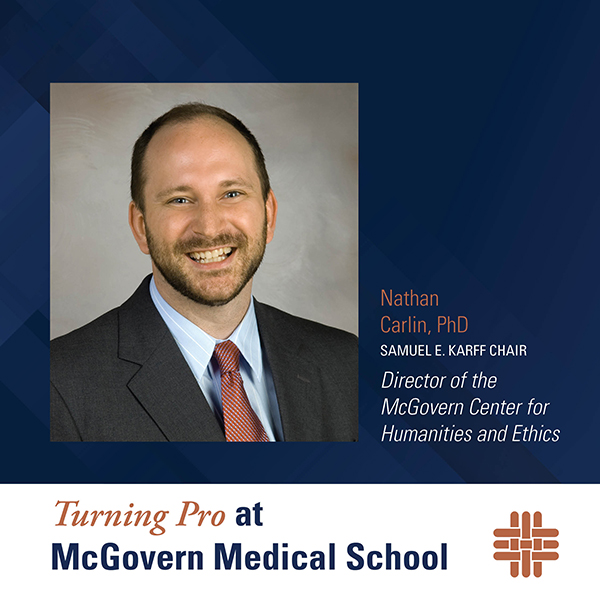Turning Pro at McGovern Medical School: Nathan Carlin, PhD

Education toward professionalism is more than being skilled and knowledgeable. It requires a lifelong transformational change in how we think, act, and feel as doctors. This professional formation (Turning Pro) is shaped by the community in which we are surrounded.
The Turning Pro series explores the myriad of ways McGovern Medical School is educating for lifelong transformation change, so we are individually and collectively highly competent, adaptable, committed to values, and guided to having meaningful lives.
In this issue, Nathan Carlin, PhD, director of the John P. McGovern, MD, Center for Humanities and Ethics, discusses the center’s mission.
Professional Identity Formation: A view from the McGovern Center
At the McGovern Center for Humanities and Ethics, we pursue teaching and scholarship that examines the context and experience of medicine and healthcare, broadly conceived, exploring questions relating to ethics, illness, well-being, and more.
What distinguishes us as a center is that we conceive of ethics as a part of the humanities. Therefore, the humanities play a central role in what we do. While we are not primarily an arts or creative writing shop, these activities are very important to us and feature strongly in our programming.
Also, as a center, we share a commitment to caring for persons as individuals: whether patients, students, or healthcare providers, believing that every person’s story matters. We are especially interested in fostering diverse voices in this regard.
With my mentor, Thomas Cole, and his mentor, Ronald Carson, I coauthored the first textbook in medical humanities: “Medical Humanities: An Introduction.” In the book we offer a definition of the field that has become widely accepted.
“an inter- and multidisciplinary field that explores contexts, experiences, and critical and conceptual issues in medicine and health care, while supporting professional identity formation.”
So, in our courses and programs, we draw on history, literature, philosophy, the social sciences, religious studies, law, and other fields and disciplines.
What is key to our definition is that we see medical humanities as supporting professional identity formation. In other words, medical humanities has an essential practical component. This is not to discount pursuing knowledge for its own sake. Rather, this is just to recognize that our teaching in a clinical context matters in a different way than at a college or university, because the things that we talk about require action now. Decisions need to be made with particular patients in particular rooms at particular times. We have conversations with trainees to help them have conversations with patients and their families, thus contributing to the moral formation of students and residents.
Medical humanities helps with professional identity formation in another way as well. I have a theory – completely untested – that burnout in medical circles is not primarily about workload and time. To be sure, I think structural issues are important. And I do not think that lectures on resiliency or yoga sessions are the solution to burnout.
My theory is that burnout is caused by a lack of creativity in one’s life. Medicine attracts the best and brightest minds that the world has to offer, yet for various reasons, students, residents, and attendings find themselves disconnected from the intellectual and artistic endeavors that once stimulated them. The humanities can help clinicians rediscover the spark that lit their passion for medicine in the first place.
To sum up, medical humanities supports professional identity formation in two ways: (1) it aids in the moral formation of trainees; and (2) it kindles passion, inspires creativity, and encourages curiosity among our gifted clinicians, who often find themselves constrained by the forces of modern medicine.
Would it be too much to wonder if engaging this material – medical humanities – might just save our souls?